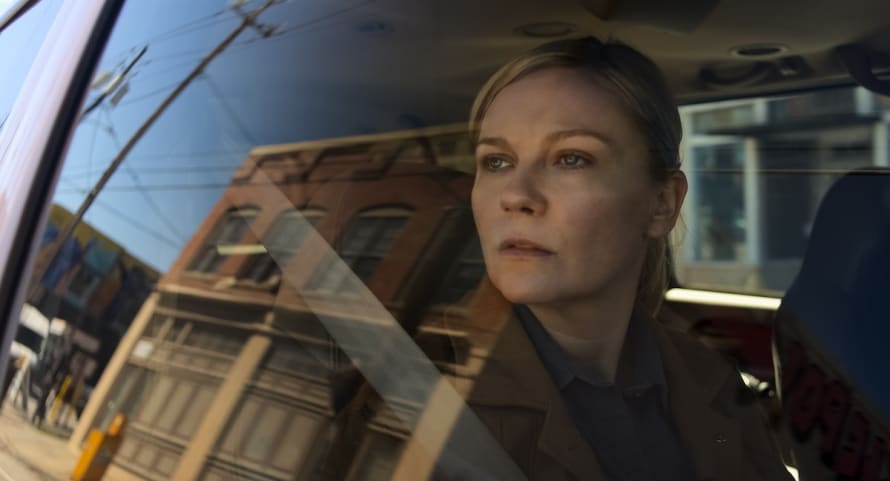To describe Civil War as a buddy road trip film isn't exactly accurate, but it's not entirely incorrect either. In place of White Castle burgers, the end destination is the White House. Instead of a van dressed up as a shaggy dog, the vehicle of choice is a road-worn SUV that's decorated with bullet holes and blood stains. And rather than a journalist touring with a rock band across America, four journalists cross a war-torn country with a divided and volatile population. Civil War may not be as funny or lighthearted as the typical road trip movie, but it entertains in its own terrifying, cerebral way.
Alex Garland spends little to no time explaining why, in his fictional reality, the United States is at war with itself. We understand that the country's president is a sitting duck whose days are numbered as the Western Forces (a Texas–California alignment) zero in on Washington to end his fascist reign.
Kirsten Dunst stars as Lee, a war photojournalist who makes her way from California to Washington, D.C., with her colleagues Joel (Wagner Moura) and Sammy (Stephen McKinley Henderson), and aspiring photojournalist Jessie (Cailee Spaeny). The end goal of their journey isn't to initiate peace talks or take down the president (Nick Offerman) — their goal is simply to document history as it unfolds before them.
The parallels between Civil War and the current state of our neighbours down south are palpable, but Garland has been incredibly clear that he's not taking sides with this film. In doing so, though, he's opened up his film to be revered and despised by everyone; and, inevitably, both left- and right-wingers will walk away from the film feeling incredibly upset or incredibly validated. This may end up being the crowning achievement of this film: it's not an easy feat to have both ends of the ideological spectrum simultaneously think the movie is harmful for its centrist behaviour, liberal propaganda and use of archival footage from prominent conservative pundits/influencers.
What Garland does impress upon audiences is the importance of journalism, particularly photojournalism. Silence falls as we review the stills taken by Lee and Jessie instilling the significance of untouched photo evidence, while throughout the film, we see how the weight of witnessing so many horrors and tragedies weighs on an individual.
Dunst and Spaeny drive this aspect of the film with striking performances that play off each other (the veteran and the newcomer, respectively) exceptionally well. Spaeny's fresh-faced, assured attitude tessellates perfectly with Dunst's exhausted sharpness, underpinned by the knowledge that what they're doing is necessary for the future of their country and for generations to come.
While the story and how it plays out will dominate discussions about Civil War, this film is a technical marvel. The sound design in particular more than justifies the IMAX premium ticket, with the explosions and gun shots feeling so visceral, coupled with incredible editing, leaving audiences feeling winded in a tight 109-minute runtime.
Civil War is shaping up to be the most divisive movie of the year, perhaps by design from Garland. But the film shouldn't be looked at as an argument starter; instead, at its heart, it holds up a heightened mirror to not just the United States but also countries all around the world experiencing these dangerous pendulum swings. It asks us to consider the state of our nations and communities, and how it is we got here.
